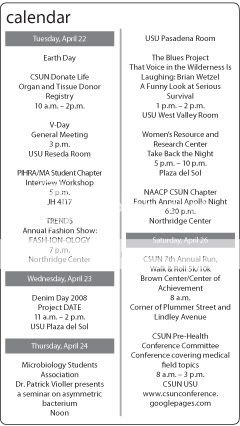We rely on plastic water bottles as if they are the only source of water left on earth.
Kids running around outside have a liter of water waiting for them on the side of the curb, but they never really drink it. Adults carry them around town as they run errands, taking a sip here or there. It’s a must have item.
But millions of water bottles will be twisted open and then tossed into the trash today without a second thought.
In 2006, more than 70 million disposable water bottles were opened everyday in the United States according to the Container Recycling Institute website. And this year, at least 37 billion cans and plastic bottles have already been sent to landfills, incinerators, or left on the street.
Little things like this count and are a problem for our environment.
I have not been much of an environmentally conscious person myself. So, I decided to take note of just how much plastic I use in one day, or better said, how much I waste in one day.
I realized my weakness is not plastic water bottles but paper. The amount of paper I use to print research information is ridiculous when I could simply look at it on the computer screen instead.
Then, there are the famous sturdy paper towels I use multiple times when I really don’t need to and paper napkins sitting in my car that pile up and eventually go into the trash. All of which come purely from trees, because I don’t buy products made from recycled materials.
By doing little things like using one less paper towel square, recycling the paper, or using one napkin and not five, people can decrease the amount of items put into the trash all together and eventually change the amount of energy put forth to make these products from scratch.
This truth has been told to me before, but for some reason I never really understood the power I hold in doing something about it.
Just the other day, a six-year-old boy asked me why I was wasting water when I had left the hose running in the yard.
With that question, I had to think further about the role I play here on earth.
The action of one person can sometimes seem limited in value, when there are other serious problems like global warming and water shortages. Solutions seem out of reach.
But I have found that the first action we can easily take is reducing what we use. We don’t have to live without, but rather live with, a little less by finding ways to improvise.
Water bottles are not a necessity when people can purchase a small container that can be used again and again. There are some water jugs that are made to stay cold too; you just put them in the freezer the night before. This can eliminate the need to produce billions of water bottles.
This is not to say that recycling plastic isn’t a solution to this particular problem as well, but not everyone recycles. The production of plastic bottles and the amount of them put into landfills would go down dramatically if people were willing to buy a small water jug to use throughout the day.
And what ever happened to using a glass for water when hanging around the house?
When it comes to paper towels and napkins, it can be difficult to completely part from them. Let’s be realistic, not everyone is going to use cloth napkins.
A shopping guide on the National Resources Defense Council states that “if every household in the United States replaced just one roll of virgin fiber paper towels with 100% recycled ones, we could save 544,000 trees.” The same goes for toilet paper and facial tissue. The littlest decisions do count.
Reducing the use of materials is just one aspect in the solution, but it’s a start for people like me who don’t know where to start.
On this Earth Day, try to take notice of what you are doing to contrbute to the problem and try to change it. It doesn’t have to be something big, you can start small.






